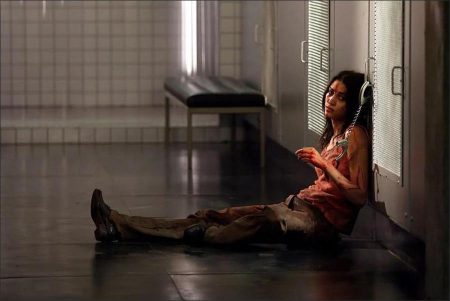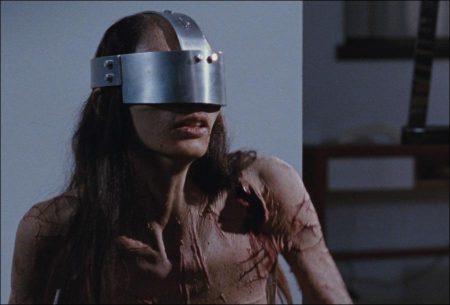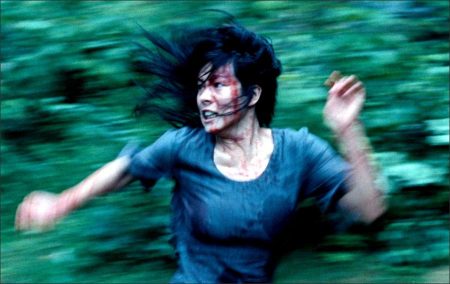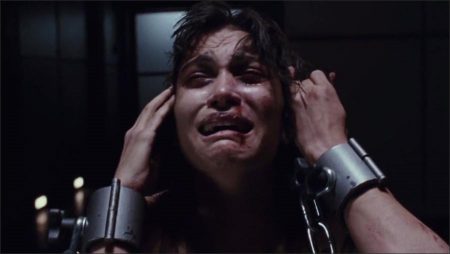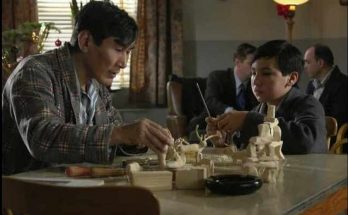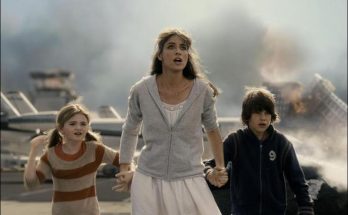Film Review for Martyrs
Martyrs Movie Trailer. Eight years ago, the horror community was electrified – a term that implies both a shock and an excited, skin-prickling awakening – by the release of a resolutely bleak French-language film named Martyrs. Directed by the hitherto obscure Pascal Laugier and starring unknown actresses Morjana Alaoui and Mylène Jampanoï, the film, a low-budget French-Canadian production made for just under three million euros, quickly began to assert its place in horror movie history.
Some viewers saw it when it premiered at Cannes in 2008 – one of the most controversial films to hit the festival since Gaspar Noé’s Irreversible – while others caught it later that year at London’s FrightFest. Others first heard about it through word of mouth – through reports of audiences fainting in the aisles and vomiting after watching its scenes of extreme torture.
An English-language remake of the film, directed by Kevin and Michael Goetz, written by The Revenant screenwriter Mark L Smith and released today, is already generating lukewarm reviews. The most common complaints are that it’s irredeemably “watered down”, lacking both the graphic violence and the compelling power of the original. But it’s worth remembering that the first reviews of Martyrs weren’t that all that complimentary either – for the exact opposite reasons. Time Out described it as a “baroque ‘torture porn’ hope-sapper”, while the Telegraph’s Tim Robey advised readers: “You really don’t need to see this.”
Other reviewers were more concerned by what they saw as an attempt to combine torture with titillation. “You may well feel in need of a shower after sitting through Martyrs, a slick essay in Gallic torture porn in which a pair of hysterical young women slip and slide around in pools of blood wearing naught but their undies,” wrote the Guardian’s Xan Brooks, in a one-star review.
Crucially, however, some of these early critics – so quick to leap on the “torture porn” label– completely missed the point. Yes, Martyrs – which tells the story of a young woman (Lucie, played by Jampanoï) who tracks down the people responsible for torturing her as young child – is notoriously difficult to watch.
Throughout the course of the film we see Lucie suffer gruesome hallucinations and self-mutilate due to past trauma, and witness the bloody massacre of a family of four – children included. And Martyrs’s final section, which focuses on Lucie’s friend and would-be lover Anna (Alaoui), is almost entirely composed of sustained, dispassionately clinical scenes of torture – all of which build to a famously grim conclusion (Game of Thrones villain Ramsay Bolton would probably approve).
Where the film differs from other “torture horrors” such as Hostel and Saw, however, is in its profoundly despairing, nihilistic tone (Laugier wrote the script while suffering from depression) and in the fact that it never encourages viewers to relish or enjoy its painful scenes. Instead, audiences are encouraged to identify wholly with Anna, responding to her humanity and suffering along with her. It’s less torture “porn”, and more just plain torture.
In one pivotal scene Anna discovers a victim, chained in a cellar dungeon beneath a family home. She’s a terrifying sight: her eyes covered with a metal visor which has been nailed into her skull and her emaciated body covered in scars and scratches.
Our first instinct is to shy away – to shun this horrific, yelping creature, who has been brutalised into something less-than human, and is all the more frightening for it. And yet, just as we’re poised for a nasty shock or attack, Anna reaches for the woman’s hand, presumably offering her the first kind, truly human contact she has received for years.
In a film filled with savagery and horror, it’s a moment that shocks to the core: a reminder that unexpected tenderness can be as viscerally, skin-shiveringly affecting as torture.
Some authors have speculated that Martyrs– like other French horror films of the past 20 years, such as Xavier Gens’s Frontiers – deliberately evokes deep-set trauma from France’s past.
Images of Anna’s shaved head, for example, recall Les Femmes Tondues, the “tarred and feathered” French women shamed for collaborating (and sleeping with) with Nazis after the Second World War, as well as France’s most famous heroine, that martyred Joan of Arc. (If you’re in the mood for a thematically aligned but unusually intense evening, try double-billing Martyrs with Dreyer’s 1927 The Passion of Joan of Arc.)
Like the worst real-world monsters (Josef Mengele is the obvious example), the movie’s torturers, whose true motivation is revealed in the final act, are also convinced that they’re doing the right thing. They see themselves as experimenters, explorers, brave pioneers – and, disturbingly, Martyrs manages to temporarily put its audience into their blood-stained shoes. Even as we wince for the film’s victims, we find ourselves simultaneously desperate to know what their abusers will uncover.
Ultimately, horror movies can frighten us in lots of different ways, combining their inherent darkness with sly humour, adrenalin-fuelled scares, or with painterly splashes of gore. But Martyrs is a rare creation: a 21st-century film that subtly elicits all the sorrow of the preceding century, imbues its scenes of torture with a sense of vivid, heart-breaking pity, and forces us to really feel. Is it painful to watch? Very much so. But worth the suffering? Absolutely.
Martyrs (2008)
Directed by: Pascal Laugier
Starring: Morjana Alaoui, Mylène Jampanoï, Catherine Bégin, Robert Toupin, Patricia Tulasne, Juliette Gosselin, Xavier Dolan, Erika Scott, Anie Pascale, Isabelle Chasse
Screenplay by: Pascal Laugier
Production Design by: Jean-Andre Carriere
Cinematography by: Stéphane Martin, Nathalie Moliavko-Visotzky, Bruno Philip
Film Editing by: Sébastien Prangère
Set Decoration by: Louisa Schabas
Music by: Alex Cortés, Willie Cortés
Distributed by: The Weinstein Company
Release Date: September 28, 2008
Views: 173
